By Meera Satpathy, Founder and Chairperson, Sukarya
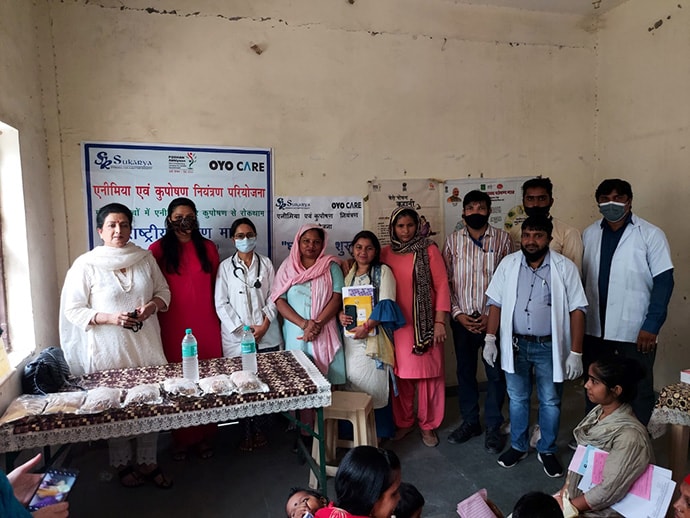
Meera Satpathy, the founder of Sukarya with nutritionists and health care professionals are seen at the celebration of Poshan Maah – the Nutrition Month, event where Sukarya intervenes with its CSR partners in the local slum communities of Sector 24, Nathpur Gurugram, Haryana. The aim is to improve the nutritional outcomes for children under 6 years of age and pregnant and lactating mothers. Photo: Sukarya
If we go by the UN’s Definition, food security means that all people, at all times, have physical, social, and economic access to sufficient, safe, and nutritious food that meets their food preferences and dietary needs for an active and healthy life.
It is also a well-known fact that Gender Inequality leads to and results from food insecurity. According to estimates, girls and women make up 60% of the world’s chronically hungry, and the world has made little progress in ensuring the equal right to food for women. In fact, at the global level, the gender gap in the prevalence of moderate or severe food insecurity grew even more significant in the year of the COVID-19 pandemic.
India is no exception. As per the National Family Health Survey 5 report published in 2021, an estimated 57 percent of women aged between 15 and 49 years in India were affected by anemia; among the children (5 -60 months), the percentage of being anemic is a whopping 67%.
Since the months during the Covid-19 lockdown, the loss of livelihood amidst social distancing rules has disproportionately affected our slum communities – migrant workers, daily wage earners, the urban poor, and other vulnerable groups of women & children in tens of thousands. From the social development perspective, the pandemic has taken us back by at least a decade. As always, the already underprivileged, like the daily wage earners, and women and children who live in urban slums, were among the worst hit.
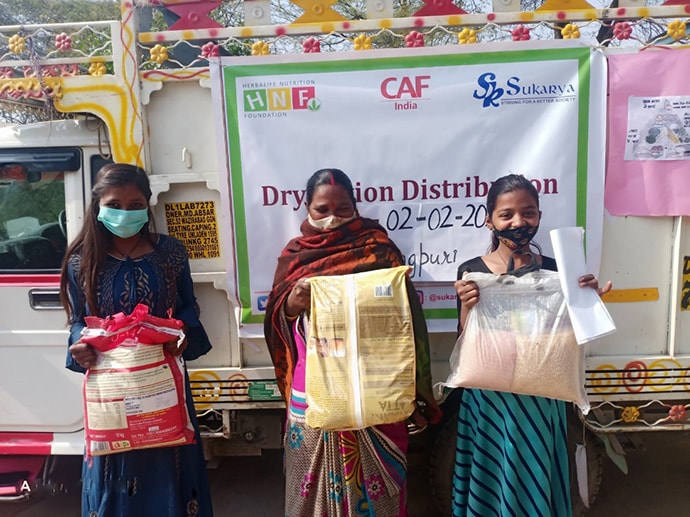
With the support of Herbalife Nutrition Foundation we are distributing dry ration packs to the students of Education on Wheels Project. This is being done to ensure food security – a basic right. Photo: Sukarya
Sukarya, which works to empower women and children in the slums of Delhi and Gurgaon, quickly swung into action. Within days, its COVID Relief Food Support Program ensured the arrangements and distribution of thousands of dry food packets among these slum-dwellers that faced acute food shortages, with a particular focus on reproductive-aged women [15-49 years] and children below five, who are the most susceptible to anemia and malnutrition. These packets, which contain enough flour, rice, pulses, and oil to feed a family of five, were distributed among 38 slums over the past year.
Sukarya also organized camps across these slums to sensitize and generate awareness about the safety measures to avoid infections and the benefits of vaccination against the deadly virus, as well as the importance of nutrition. Between May 2021 and March 2022, these interventions helped over 4000 marginalized families, or 20,000 people if we take an average of 5 members per family, living in 38 urban slums in Delhi and Gurgaon, tide over an acute crisis of poverty and hunger.
Of course, this mission would not have been possible without the prompt and generous support of donors who stepped up to help us. Team Sukarya would like to express gratitude to GlobalGiving, Give India, Sukarya USA, Fidelity International and Herbalife Nutrition Foundation, Charities Aid Foundation India, and all the other companies and individuals who helped us with their generous contributions.
While the fourth wave of Covid is on its way, we must fight it together as we have been doing so far, and we look forward to your continued support.
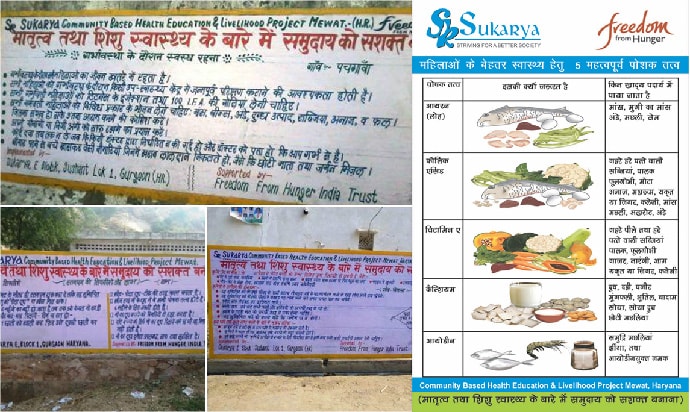
Sukarya’s wall writings in Hindi about good maternal-child health and nutrition awareness in the slums and villages. Photo: Sukarya
Sukarya is one of the few organizations in the country that has been consistently working on Nutrition issues for the last 24 years under its maternal and child health program. Sukarya realized the need for nutritional intervention in the very early stage of community development work, and since then, the organization has been striving to improve the situation.
Here is a list of few key Sukarya projects that had nutrition interventions with significant impact on targeted group and communities:
- Prevention of prevalence of Anemia and malnutritionwith support of Population foundation of India — 2006–2009
- Men in partner project with support of concern India -2009–2010
- Knowledge based Intervention for Reproductive Health Advocacy and Action (KIRAN)– Mewat Haryana with support from Population Foundation of India; Mobilizing Men As Partners To Support Women And Children Health in Mewat Haryana with the support of Bird Group and Give India; Anemia Prevention and Control in Gurugram, Haryana supported by Population Foundation of India – 2009-2011.
- HIFAZAT– Improving maternal and child health in the far I reached areas through specialized health clinics with the support of Power Grid Corporation of India — 2011-2012.
- HIFAZAT 2– Improving maternal and child health in the far I reached areas through specialized health clinics supported by Bird Group – 2012-2013.
- Community based health Education Projectwith support of Freedom from Hunger India trust -2013–2015
- Integrated Rural Development Project (IRDP)with the support of Bird group — 2011–2014
- IRDP 2 Project with the support of Bird Group -2015–2018
- USHA Project(URBAN SLUM HEALTH ACTION) – Detection, treatment and prevention of anemic conditioning and malnutrition among mothers (15-49 years) and children up to 5 years with the support of Wipro Cares, Fidelity International, Krishna Maruti, OYO etc. – 2013-2022
- Rural Health Action Program(RCHA) – Detection, treatment and prevention of anemic conditioning and malnutrition among mothers (15-49 years) and children up to 5 years with the support in Mewat Haryana and Alwar Rajasthan with the support of Bird Group – 2021- continuing.
- MMITRAVOICE – A call program for maternal and child health – in 4 districts of Haryana and slums of Delhi – 2016-2019.
- Community based Health Education and Livelihood Projectin Mewat, Haryana with the support of Freedom from Hunger India- 2014-2016.
At the nutrition workshop, “Santulit Aahar — Phalta Phulta Parivar “ (Balanced diet and healthy family), organized on December 13, 2008, in village Bandhwari to develop awareness on what constitutes a healthy dietary pattern for different age groups and motivate the participants to adopt these. In this workshop, a recipe book was published by Sukarya ‘Prabhavshali Vyanjan Vidhia’ (Effective Cooking Recipe in Hindi) — that provides simple recipes that are easy to prepare using locally available ingredients in a short time and are rich in iron and vitamin C. The recipe booklet had a simple information tool helping to prevent anemia by giving information on simple food preparation that, if followed, ensures the requisite adult daily requirement of iron in one’s diet.
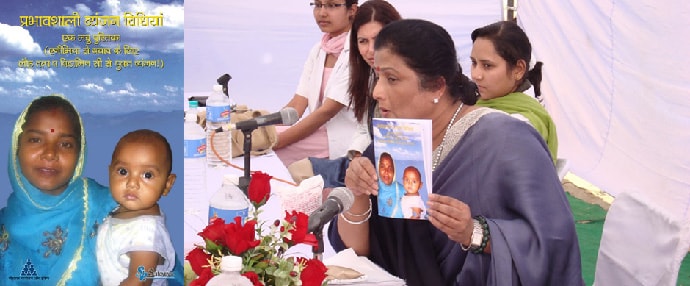
Launching of Sukarya’s nutrition recipe book (in Hindi) in 2008. Photo: Sukarya
This shows Sukarya’s commitment to reducing malnutrition and undernourishment through a multi-pronged strategy targeted at three key areas:
- Building Awareness and changing the attitudes and practices of people so that they prepare and consume healthy, nutritious meals using inexpensive, locally available ingredients.
- Strengthening and promoting breastfeeding for lactating mothers.
- Providing micro-nutrients and essential supplements
Sukarya has intervened with appropriate strategies to cater to each group with a customized approach. We also believe that issues are multi-faced, multidimensional, and interrelated. Therefore, from its inception, Sukarya has adopted a comprehensive approach to attain the desired result. Nutrition issues are not only about lack of food and resources but also about lack of access, knowledge, information, dietary habits, sociocultural dynamics, and Gender aspects.
Sukarya works on both demand and supply verticals to ensure effective results. The simple, effective, and community-friendly approach and appropriate strategies like participatory planning, involvement of men and significant others, key community stakeholders, visual display as a tool, simple medication and home-cooked food, rigorous follow-ups, modified age-old practice couple counseling, referrals and connecting with government, personal touch to each client/beneficiaries, and prompt and immediate solutions against the old procedural work have yielded tremendous results.
The followings are the key activities that led to significant improvement in Nutrition status and reduced the prevalence and incidence of anemia and malnutrition in intervened areas:
- Promotion of locally available low-cost Nutrition food grains, leafy vegetables, and fruits
- Nutrition demonstration workshops
- Use of Iron utensils & Double Fortified salt
- Health Education sessions in School
- Nutrition demonstration workshop at the community level
- Establishing nutrition centers in villages
- Setting up cereal processing unit with women Self Help Groups (SHGs)
- Medical health camps/Hemoglobin test and Counseling
- Distribution of (Iron & Folic Acid) IFA tablets
- Calcium and vitamin A supplements
- Promoting Exclusive breastfeeding and Colostrum feeding
- Promoting and providing Micronutrients
- Group sessions /health sessions / Special cooking demos/classes with pregnant and lactating women.
- Teaching Nutrition Recipe/Cooking classes targeted explicitly to adolescent girls, Children, pregnant and lactating women, and targeted anemic patients
- Nutrition workshops at the Community level
We have observed that malnutrition is the most common and critical health problem prevailing among the rural and urban poor that impacts their overall health and well-being. Through nutrition demonstrations and workshops, the team Sukarya imparted information and knowledge on a balanced diet, which they can prepare from cheap, nutritious, locally available food. The nutritionist also helped to showcase healthy cooking methods to encourage people to adopt healthy cooking practices.
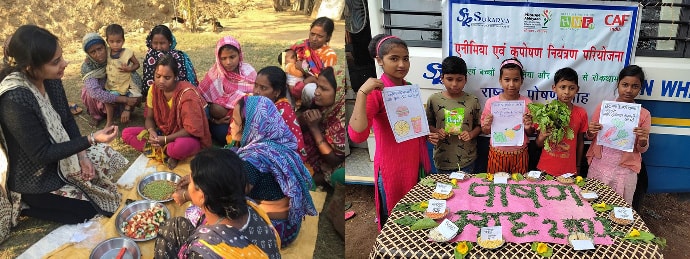
Proper nutrition cooking demonstration by a nutritionist and nutrition awareness session for children of the Education on Wheels program are regular features of Sukarya’s interventions in the slum and village communities. Photo: Sukarya
Since women are primarily responsible for cooking in the household, a change in their eating and cooking habits would result in a positive difference in the dietary patterns at the household level. Thus, the focus of the intervention was specially to sensitize the women and bring about a change in their cooking methods; for instance, the cooking of Green Roti and Amla Chatni is frequently demonstrated (especially in winter). The ingredients for the Green Roti are relatively inexpensive and readily available, like Soyabean Aata (Soyabean Flour), Chana Aata (Gram Flour), Palak (Spinach), and Bathua Chatni (Chenopodium Greens Chutney) is another simple and easy-to-make recipe iron-rich made from Amla, Dhania (Cilantro), Ginger, Garlic, and Salt. This kind of workshop has been an ongoing activity of Sukarya.
Sukarya has impacted more than six million lives in more than 630 villages and 120 urban slums, but it has a long way to go. Its war against food insecurity needs extended capacity building and intervention on a bigger scale. Sukarya needs support and funding from organizations and agencies to continue its mission of “Striving for a Better Society.”